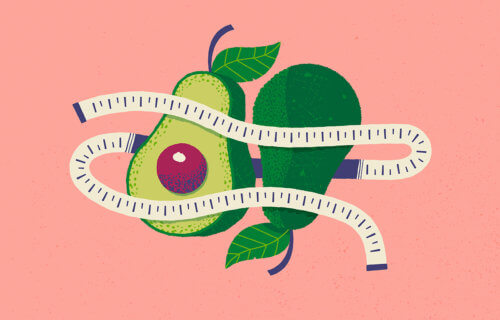CHAMPAIGN, Ill. — Avocados are already widely considered delicious and nutritious. Now, a new study reports eating an avocado a day could help women reshape and reduce belly fat.
Researchers from the University of Illinois Urbana-Champaign tracked a group of women for three months. Those who consistently ate one avocado daily saw a drop in deeper visceral abdominal fat.
“The goal wasn’t weight loss; we were interested in understanding what eating an avocado does to the way individuals store their body fat. The location of fat in the body plays an important role in health,” study leader Naiman Khan, an Illinois professor of kinesiology and community health, says in a media release. “In the abdomen, there are two kinds of fat: fat that accumulates right underneath the skin, called subcutaneous fat, and fat that accumulates deeper in the abdomen, known as visceral fat, that surrounds the internal organs. Individuals with a higher proportion of that deeper visceral fat tend to be at a higher risk of developing diabetes. So we were interested in determining whether the ratio of subcutaneous to visceral fat changed with avocado consumption.”
Study participants, both male and female, were separated into two groups. One group was given a daily meal that included an avocado, while the other cohort received a nearly identical meal besides no avocado. At the beginning and end of the 12-week study period the research team measured subjects’ abdominal fat and “glucose tolerance,” considered a marker of both overall metabolic functioning and diabetes risk.
Sure enough, women who ate an avocado regularly enjoyed a significant reduction in their visceral abdominal fat, which is often the hardest fat to get rid of and considered an indicator of high disease risk in large amounts. Moreover, those same females also experienced drop in their ratio of visceral fat to subcutaneous fat, which suggests a redistribution of fat away from their organs.
Importantly, however, men who followed the same diet and avocado consumption patterns did not experience any fat distribution changes. No participants saw changes to their glucose tolerance either.
“While daily consumption of avocados did not change glucose tolerance, what we learned is that a dietary pattern that includes an avocado every day impacted the way individuals store body fat in a beneficial manner for their health, but the benefits were primarily in females,” Khan explains. “It’s important to demonstrate that dietary interventions can modulate fat distribution. Learning that the benefits were only evident in females tells us a little bit about the potential for sex playing a role in dietary intervention responses.”
Moving forward, study authors would like to conduct further research on this topic. Next time they aim to provide study subjects with all of their daily meals and gain further insight into the metabolic effect of avocado consumption on both men and women.
“Our research not only sheds a valuable light on benefits of daily avocado consumption on the different types of fat distribution across genders, it provides us with a foundation to conduct further work to understand the full impact avocados have on body fat and health,” notes study co-author Richard Mackenzie, a professor of human metabolism at the University of Roehampton in London.
“By taking our research further, we will be able to gain a clearer picture into which types of people would benefit most from incorporating avocados into their diets and deliver valuable data for health care advisers to provide patients with guidance on how to reduce fat storage and the potential dangers of diabetes,” he concludes.
The study is published in the Journal of Nutrition.
